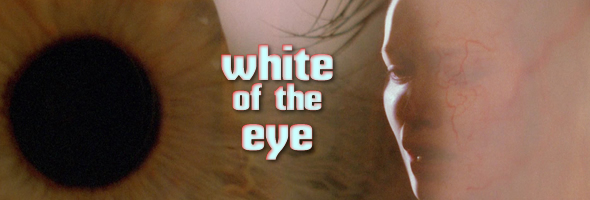
Color, 1987, 111m.
Directed by Donald Cammell
Starring David Keith, Cathy Moriarty, Alan Rosenberg, Art Evans, Alberta Watson, Danielle Smith
Arrow (Blu-ray & DVD) (UK RB/R2 HD/PAL), Maelstrom (DVD) (Holland R2 PAL) / WS (1.85:1) (16:9) / DD2.0
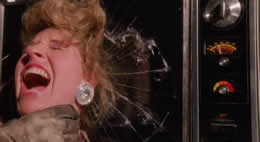 It took almost a decade for director Donald Cammell
It took almost a decade for director Donald Cammell 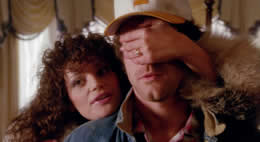 to make this art house shocker after the one-two '70s punch of the masterpiece Performance and the compromised but fascinating Demon Seed, and in the interim, his trademark elliptical narratives and fragmented, dazzling visuals had become completely absorbed into the mainstream thanks to music videos and filmmakers like David Lynch. Nevertheless, Cammell proved with White of the Eye that he could still make a film as troubling and audacious as his past glories and even ruffle the MPAA's feathers again, with pal Marlon Brando stepping in to help it dodge an X rating. Ultimately that didn't help much since the film still barely played on any screens, a fate that also befell his even more unfortunate fourth and final film, Wild Side.
to make this art house shocker after the one-two '70s punch of the masterpiece Performance and the compromised but fascinating Demon Seed, and in the interim, his trademark elliptical narratives and fragmented, dazzling visuals had become completely absorbed into the mainstream thanks to music videos and filmmakers like David Lynch. Nevertheless, Cammell proved with White of the Eye that he could still make a film as troubling and audacious as his past glories and even ruffle the MPAA's feathers again, with pal Marlon Brando stepping in to help it dodge an X rating. Ultimately that didn't help much since the film still barely played on any screens, a fate that also befell his even more unfortunate fourth and final film, Wild Side.
This hypnotic thriller manages to echo Claude Chabrol's study in primal masculine destruction, Le boucher, and the slick shock tactics of the Italian giallo, except transposed to the Arizona desert where a psycho is brutally killing off housewives. In fact, the film's opening murder alone is a masterful show stopper as a grisly murder is shown in a mid-afternoon suburban house without a genuine drop of blood or cleaver wound actually shown, instead using unsettling 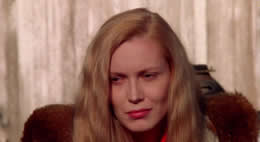 cutaways and acrobatic camera movement to jolt the audience. The main plot, such as it is, concerns an audio equipment installer named Paul White (Keith) who runs a seemingly happy household with his wife, Joan (the great Moriarty, in only her third film after Raging Bull and Neighbors) and their oddly androgynous daughter (Smith). The couple's hazy, post-hippie past also involves her ex-boyfriend, Mike (Rosenberg), who still hangs around and might have his own set of motivations. While Paul's fending off some potential adulterous overtures from his clients, his life gets even more complicated when the investigating detective (Evans) in charge of the slayings hits a little too close to home and fingers Paul as a suspect, leaving an increasingly unsettling Joan to piece things together herself.
cutaways and acrobatic camera movement to jolt the audience. The main plot, such as it is, concerns an audio equipment installer named Paul White (Keith) who runs a seemingly happy household with his wife, Joan (the great Moriarty, in only her third film after Raging Bull and Neighbors) and their oddly androgynous daughter (Smith). The couple's hazy, post-hippie past also involves her ex-boyfriend, Mike (Rosenberg), who still hangs around and might have his own set of motivations. While Paul's fending off some potential adulterous overtures from his clients, his life gets even more complicated when the investigating detective (Evans) in charge of the slayings hits a little too close to home and fingers Paul as a suspect, leaving an increasingly unsettling Joan to piece things together herself.
Very little about White of the Eye functions like a normal thriller, especially for a time when fare like Jagged Edge was drawing most adult viewers. The murderer is actually unmasked fairly early in the narrative, and though it isn't particularly graphic in the traditional sense, the film trades in a queasy barbarism on the part of the villain that still packs a shocking punch. (The bathtub scene isn't one you'll forget very quickly.) Add to that a hallucinatory music score co-written by Pink Floyd's Nick Mason, an outrageous climax that could've stepped out of Texas Chainsaw Massacre 2, and two unbelievably committed lead performances from Moriarty and Keith, and you have one of the great unsung cinematic gems of the 1980s. 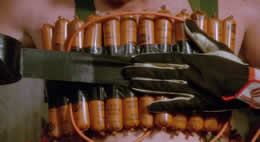
After its burial in domestic movie theaters, White of the Eye found a surprisingly healthy VHS life courtesy of Paramount (who picked it up from indie distributor Palisades) before basically dropping off the face of the earth for many years. Occasionally theatrical screenings kept its reputation alive among cult circles, while rumors swirled for years about various American distributors trying to pick it up. Nevertheless, it continues to remain unavailable in its native country to this day. A 2006 Dutch DVD offering a welcome anamorphic upgrade from the very blurry VHS edition, though the room left for improvement was still considerable.
Thankfully, said improvement can easily be found in the 2014 UK edition from Arrow Films, a Blu-ray/DVD combo in both standard and steelcase packaging options. The transfer looks terrific, not surprisingly, and offers a faithful replication of the film's unusual appearance in 35mm (with darker 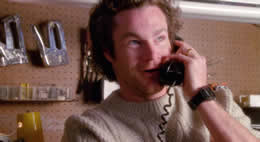 scenes often deliberately underlit and grainy, while the flashbacks were deliberately given a blown out appearance thanks to photochemical processing). There's more image info visible in the frame, too, and the colors have a pleasingly vibrant intensity evident right from the very bold opening credits. The LPCM two-channel sound mix is also faithful to the original source, sounding a bit limited by the standards of the era but definitely packing a bass-heavy punch where it needs to. The extras are substantial as well, starting off with an audio commentary by Cammell biography Sam Umland; he does a solid job of juggling production info with aesthetic readings of the film, often breaking down recurring motifs within Cammell's body of work and pointing out variations from the script to screen. Also appearing here, finally, is the great 1998 BBC documentary Donald Cammell: The Ultimate Performance, shown two years after the director's suicide. You know you're in for a wild ride when none other than Barbara Steele pops up in the opening minutes, and along the way other contributors include Nicolas Roeg (of course), Moriarty, Mick Jagger, James Fox, and many more. Fantastic stuff.
scenes often deliberately underlit and grainy, while the flashbacks were deliberately given a blown out appearance thanks to photochemical processing). There's more image info visible in the frame, too, and the colors have a pleasingly vibrant intensity evident right from the very bold opening credits. The LPCM two-channel sound mix is also faithful to the original source, sounding a bit limited by the standards of the era but definitely packing a bass-heavy punch where it needs to. The extras are substantial as well, starting off with an audio commentary by Cammell biography Sam Umland; he does a solid job of juggling production info with aesthetic readings of the film, often breaking down recurring motifs within Cammell's body of work and pointing out variations from the script to screen. Also appearing here, finally, is the great 1998 BBC documentary Donald Cammell: The Ultimate Performance, shown two years after the director's suicide. You know you're in for a wild ride when none other than Barbara Steele pops up in the opening minutes, and along the way other contributors include Nicolas Roeg (of course), Moriarty, Mick Jagger, James Fox, and many more. Fantastic stuff.
Also included is a nugget familiar to Cammell fans, the short film "The Argument," which was shot in 1972 (by Vilmos Zsigmond!) but left incomplete until editor Frank Mazzola salvaged it in the late '90s, where it appeared on the British DVD of Mazzola's rescued director's cut of Wild Side. Presumably the SD video master used then is all that was available, as that's the same source here bumped up to 1080p (with optional Umland commentary as well). Even at 11 minutes, this is easily the most "out there" existing fragment of Cammell's filmography as a filmmaker in the desert embarks on a combative duel of wits with an earth goddess/witch he's summoned up in the sand. Umland also provides commentary for over five minutes of silent deleted footage from White of the Eye, including two scenes featuring an entirely excised character played by John Diehl (who was on Miami Vice at the time). None of it would have been essential to the film, but it's nice to still have in any form since it was removed by international distributor Cannon Films before the film's release. (Interestingly, rumors abounded when this film screened at L.A.'s Egyptian Theater in the mid-'00s that this longer cut would actually be screened, but presumably the missing audio was an insurmountable obstacle.) The 11-minute "Into the White: Filming White of the Eye" is probably the most candid element of the entire release as cinematographer Larry McConkey explains why he and another cinematographer were both hired at the same time and had to get different credits, goes into how Cammell thriving on creating conflict and anger, and generally paints a chaotic and somewhat disturbing portrait of the entire shoot. The rest of the disc rounds out with an 11-minute reel of the flashback scenes before the bleach bypass processing gave it that ultra-bright, chalky appearance, a slightly different alternate main titles sequence, and a booklet containing essays by Umland and Brad Stevens plus an unpublished bit about the film from producer Elliott Kastner's autobiography. Definitely recommended without hesitation.
Buy from Amazon
Reviewed on March 19, 2014.



 It took almost a decade for director Donald Cammell
It took almost a decade for director Donald Cammell  to make this art house shocker after the one-two '70s punch of the masterpiece Performance and the compromised but fascinating Demon Seed, and in the interim, his trademark elliptical narratives and fragmented, dazzling visuals had become completely absorbed into the mainstream thanks to music videos and filmmakers like David Lynch. Nevertheless, Cammell proved with White of the Eye that he could still make a film as troubling and audacious as his past glories and even ruffle the MPAA's feathers again, with pal Marlon Brando stepping in to help it dodge an X rating. Ultimately that didn't help much since the film still barely played on any screens, a fate that also befell his even more unfortunate fourth and final film, Wild Side.
to make this art house shocker after the one-two '70s punch of the masterpiece Performance and the compromised but fascinating Demon Seed, and in the interim, his trademark elliptical narratives and fragmented, dazzling visuals had become completely absorbed into the mainstream thanks to music videos and filmmakers like David Lynch. Nevertheless, Cammell proved with White of the Eye that he could still make a film as troubling and audacious as his past glories and even ruffle the MPAA's feathers again, with pal Marlon Brando stepping in to help it dodge an X rating. Ultimately that didn't help much since the film still barely played on any screens, a fate that also befell his even more unfortunate fourth and final film, Wild Side.  cutaways and acrobatic camera movement to jolt the audience. The main plot, such as it is, concerns an audio equipment installer named Paul White (Keith) who runs a seemingly happy household with his wife, Joan (the great Moriarty, in only her third film after Raging Bull and Neighbors) and their oddly androgynous daughter (Smith). The couple's hazy, post-hippie past also involves her ex-boyfriend, Mike (Rosenberg), who still hangs around and might have his own set of motivations. While Paul's fending off some potential adulterous overtures from his clients, his life gets even more complicated when the investigating detective (Evans) in charge of the slayings hits a little too close to home and fingers Paul as a suspect, leaving an increasingly unsettling Joan to piece things together herself.
cutaways and acrobatic camera movement to jolt the audience. The main plot, such as it is, concerns an audio equipment installer named Paul White (Keith) who runs a seemingly happy household with his wife, Joan (the great Moriarty, in only her third film after Raging Bull and Neighbors) and their oddly androgynous daughter (Smith). The couple's hazy, post-hippie past also involves her ex-boyfriend, Mike (Rosenberg), who still hangs around and might have his own set of motivations. While Paul's fending off some potential adulterous overtures from his clients, his life gets even more complicated when the investigating detective (Evans) in charge of the slayings hits a little too close to home and fingers Paul as a suspect, leaving an increasingly unsettling Joan to piece things together herself. 
 scenes often deliberately underlit and grainy, while the flashbacks were deliberately given a blown out appearance thanks to photochemical processing). There's more image info visible in the frame, too, and the colors have a pleasingly vibrant intensity evident right from the very bold opening credits. The LPCM two-channel sound mix is also faithful to the original source, sounding a bit limited by the standards of the era but definitely packing a bass-heavy punch where it needs to. The extras are substantial as well, starting off with an audio commentary by Cammell biography Sam Umland; he does a solid job of juggling production info with aesthetic readings of the film, often breaking down recurring motifs within Cammell's body of work and pointing out variations from the script to screen. Also appearing here, finally, is the great 1998 BBC documentary Donald Cammell: The Ultimate Performance, shown two years after the director's suicide. You know you're in for a wild ride when none other than Barbara Steele pops up in the opening minutes, and along the way other contributors include Nicolas Roeg (of course), Moriarty, Mick Jagger, James Fox, and many more. Fantastic stuff.
scenes often deliberately underlit and grainy, while the flashbacks were deliberately given a blown out appearance thanks to photochemical processing). There's more image info visible in the frame, too, and the colors have a pleasingly vibrant intensity evident right from the very bold opening credits. The LPCM two-channel sound mix is also faithful to the original source, sounding a bit limited by the standards of the era but definitely packing a bass-heavy punch where it needs to. The extras are substantial as well, starting off with an audio commentary by Cammell biography Sam Umland; he does a solid job of juggling production info with aesthetic readings of the film, often breaking down recurring motifs within Cammell's body of work and pointing out variations from the script to screen. Also appearing here, finally, is the great 1998 BBC documentary Donald Cammell: The Ultimate Performance, shown two years after the director's suicide. You know you're in for a wild ride when none other than Barbara Steele pops up in the opening minutes, and along the way other contributors include Nicolas Roeg (of course), Moriarty, Mick Jagger, James Fox, and many more. Fantastic stuff. ![]()